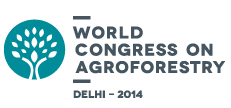Understanding Farmers: using Role Playing Games to explore futures of landscape management in the Western Ghats (India
Understanding Farmers: using Role Playing Games to explore futures of landscape management in the Western Ghats (India)
wca2014-1960 Claude Garcia 1 2,*Jeremy Vendé 3 4Konerira M. Nanaya 1 5Jenu Kalla 6Anne Dray 1Christophe Le Page 7Yenugula Raghuramulu 8Chepudira G. Kushalappa 5¨Philippe Vaast 9 10 1Forest Management and Development Group, ETHZ, Zurich, Switzerland, 2UPR Goods and Services of Tropical Forest Ecosystems, CIRAD, 3AgroParisTech, Montpellier, France, 4Ecology Department, French Institute of Pondicherry, Pondicherry, 5College of Forestry, University of Agricultural and Horticultural Sciences, Shimoga, 6Forest Management and Development Group, ETHZ, Zurich, India, 7UPR GREEN, CIRAD, Montpellier, France, 8Central Coffee Board, Bangalore, India, 9ICRAF, Nairobi, Kenya, 10UMR Eco&Sols, CIRAD, Montpellier, FranceMainstreaming biodiversity conservation into production landscapes requires careful consideration of the drivers, needs and constraints of farmers. In many cases, deforestation and degradation are the rational choice, not the result of a lack of awareness or knowledge. Here we present a case study where we used an integrated approach to understand the management of coffee agroforestry system in the district of Kodagu (India). Previous research established that farmers in this biodiversity rich production landscape are slowly replacing the complex and diverse original canopy with Grevillea robusta, a fast growing species originating from Australia. This happens despite local knowledge highlighting the agronomical and multipurpose values of the original tree species and specific tenure systems and policies enforced by the Forest Department protecting them.
We developed an integrated, participatory modeling approach to understand the drivers behind the described landscape transitions and to explore with the stakeholders the plausible livelihood and environmental impacts of a policy change once this was shown as critical. While the underlying ecological processes driving the system were modeled based on expert knowledge and published scientific literature, the actual elements of the system, the key actors and resources, and their interactions were defined together with the stakeholders. The conceptual model was transformed into a Role Playing Game and after validating the model we conducted 7 workshops (52 participants in total) with a No Change scenario as baseline where the policy framework remains unchanged, and a Restitution of Rights scenario where rights over the native trees are handed over to the farmers. The results show the transition into a Grevillea robusta dominated landscape will continue unless there is a change to the policy framework. However, the restitution of rights risks speeding up the process instead of reversing it, as other factors, such as the tree species differential growth speed, kick-in.

